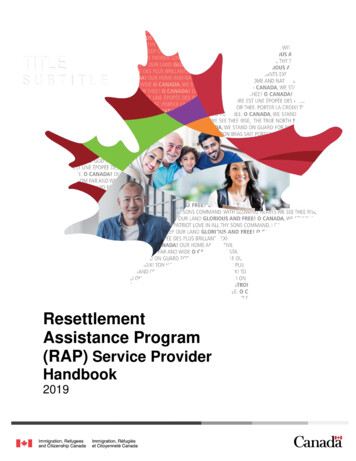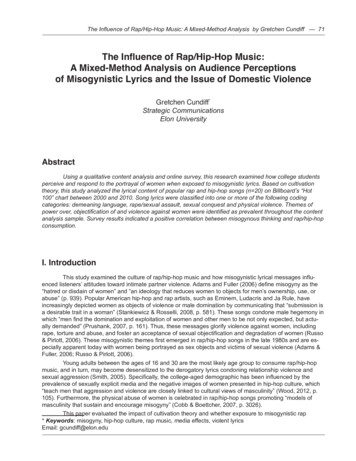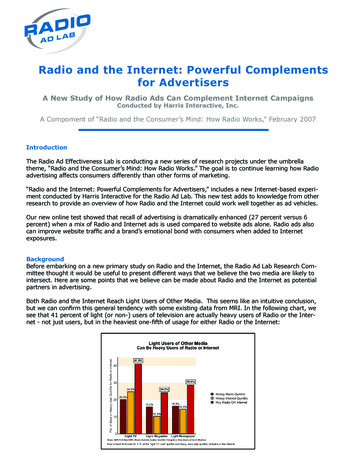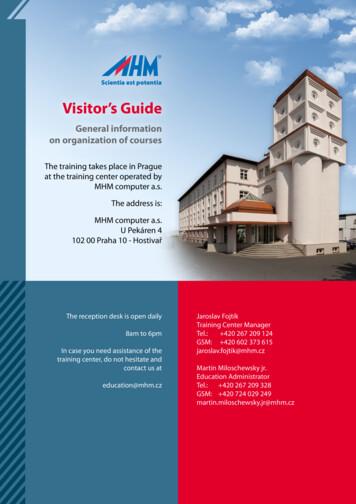
Transcription
Transcribed from www.ShrinkRapRadio.comShrink Rap Radio #420, September 11, 2014, A Model for IntegrativeMental HealthDavid Van Nuys, Ph.D., aka “Dr Dave” interviews Rubin NaimanPhD.(Transcribed from www.ShrinkRapRadio.com by Julie Twomey)Introduction:My guest today is Rubin Naiman PhD. whom Iinterviewed previously on episode #302 – Exploring MindfulDreaming, as well as on episode #256 – Mindful Sleep, MindfulDreams. Today, we’ll be discussing his model for an integrativeapproach to mental health. For more information about DrNaiman please see our show notes for this episode atwww.ShrinkRapRadio.comNow here’s the interview.Dr Dave:Dr Rubin Naiman, welcome back to Shrink Rap Radio.Rubin Naiman:Thank you very much, I’m happy to be here.Dr Dave: Well I’m happy to have you back on the show. I think I’vehad you on twice before speaking about sleep and dreaming andboth of those interviews were based on books you’ve written andtoday our focus will be a little different and as far as I know youhaven’t written a book on the topic yet but you have been offeringworkshops on it – namely a Model for Integrative Mental Health.Rubin Naiman:Yes.Dr Dave: And you sent me a PowerPoint deck to kind of give me anidea of what your thinking has been and having gone through thatdeck I suspect the workshop may be a prelude to another book,would I be right about that?Rubin Naiman: It’s a possibility, (laughs). I’ve got a couple of otherbooks in the pipeline right now.Dr Dave: Oh wow. Because the deck that you sent looked like itwould make a great outline for a book.Shrink Rap Radio #420, a Model forIntegrative Mental HealthPage 1 of 23
Transcribed from www.ShrinkRapRadio.comRubin Naiman: You know that slideshow came – well, if I can sharejust a little bit of history – the Arizona Center for IntegrativeMedicine where I’m on the Faculty, directed by Dr Andrew Weilsponsored an initial conference on Integrative Mental Health aboutfour years ago, 2010 and we had a much greater response that weanticipated. So this was an attempt on the part of Dr Weil and thecenter to expand the focus of integrative medicine and integrativehealth to basically to Psychotherapists and the response, as I said,was just phenomenal. Subsequently, Dr Weil and I presented atthe Networker Conference – a large psychotherapy conference onthe east coast I think the next year and he did a keynote addressand I did a daylong workshop and again the response wasphenomenal. So there’s a tremendous amount of thirst, of interest Ithink on the part of psychotherapists to better understand andactually use integrative approaches and so that’s where this slidedeck came from and I’ve been doing that presentation there sinceand will probably do it in other places as well.Dr Dave: Yeah, yeah, well that’s great. I have a number ofpsychotherapists that listen to the show and also a lot ofpsychotherapists in training so you’re going to have anotheraudience for your ideas here. Let me start out by asking you –what’s the problem that the Integrative Model for Mental Healthseeks to address?Rubin Naiman: Well, in a word it’s segregation. You know the word‘Integrative’ – the opposite of integrative is segregative and Iactually had to look that up some time ago because I started writingit and wasn’t even sure if it was a word because I hadn’t heard it inspeech or I don’t think I’ve read it, but it is a word and our currentapproach to health in general - mental health in particular - isactually significantly segregative, we split things apart. Wecertainly split the mind and the body. You know, there are twomajor camps in healthcare: there are those who take care of thebody, of the physical form – we call them physicians and there arethose who take care of the mind – we call them psychotherapists.Of course there’s a good deal of overlap in the number of these butthe basic message is that health is not something that’s integrated,it’s segregated and we segregate professionals as well and this is acritical issue. We have Mental Health professionals and we havephysical – we don’t call it that because we think of them as thehealth professionals Shrink Rap Radio #420, a Model forIntegrative Mental HealthPage 2 of 23
Transcribed from www.ShrinkRapRadio.comDr Dave:Right.Rubin Naiman: but physicians have been saddled with the ultimateresponsibility – the overview of health. So there’s a segregationthere too and I think there are a lot of smaller ones when we beginto look at specialization and sub-specialization. One example is Ihave a sub-specialty as you know in sleep and dreams. Part of myapproach to that – a large part of my approach, I should say isinformed by an integrative approach so when I do an evaluationand a treatment plan around sleeping and dreaming I don’t justlook at data related to sleep and dreams, you know, “How manyhours are you sleeping? . What are your behaviours beforesleep? What are your cognitions around them?”, . and so on. Iactually ask about the whole person. I look at all the psychologicalvariables, clinical psychological variables and I look at somaticissues. What’s going on in your body? I look at health issues, Ilook at medications. Historically, I started practice 30 years agoin California and I have a distinct memory or one of my colleagueswho I have to say was a bit on the OCD side - but warning me, in acaring manner, that I might have been crossing the boundary intomedical care at the time when I told him I had suggested that apatient have a cup of camomile tea to calm him down before sleep.Dr Dave:Yeah.Rubin Naiman: Standards have changed quite a bit, thank God, but inthose days – I know in my training and subsequent understandingof clinical psychological ethics we didn’t practice medicinewithout a license and simply suggesting that somebody takesomething by mouth was iffy.Dr Dave: Well has that changed? I wasn’t aware that that hadchanged.Rubin Naiman: It’s changed to a degree. I think if you look at APAethical standards for example, around medications back then we aspsychologists weren’t even permitted to discuss medications, Imean we could refer out and I know there was a pretty dramaticchange some years ago which not only allowed but encouraged usto provide information about psychiatric psychotropic medicationswhich I think is critical because they don’t often get sufficientinformation from prescribing physicians. But it has changed andShrink Rap Radio #420, a Model forIntegrative Mental HealthPage 3 of 23
Transcribed from www.ShrinkRapRadio.commost therapists that I talk to today are more open to that. Theydon’t shy away as much as they used to from that classicalbody/mind gap – which I refer to as the body/mind chasm.Dr Dave: Yeah, you know and that’s an area I’d like to explore withyou a little bit because you’re a psychologist, I'm a psychologistand as you know historically there was some criticism and cautionsand so on about the medical model and now some people areconcerned about the medicalization of psychological problems,Rubin Naiman:Yes.Dr Dave: and there are questions of, what’s the appropriate level ofintervention? Should we be intervening at an educational level?At a medical level? At a molecular level (Laughs) . an atomiclevel? The brain? There are all these kinds of questions, and so,speak to that if you will.Rubin Naiman:Dr Dave:Not to mention a spiritual level.Oh, yes, right.Rubin Naiman: I think the answer that most appropriately we have tostep back and ask ourselves, really, what are we trying to do andwhat is our major concern? - and obviously our major concern ishealth. It’s really difficult to segregate physical health frommental health. Over the years we’ve seen more and more datashowing profound links, inextricable links, for example, betweenmental psychiatric conditions like depression and heart disease, forexample, depression and cancer, anxiety and cancer. Maybe we’lltalk a little bit about this interesting parallel between autoimmunediseases and self-recrimination. So, there’s this question ofdualism which I think many of us are familiar with as aphilosophical and sometimes a spiritual question. You know, wehave a body and we have a mind and it’s not just a spiritualquestion – it’s a question that has some very practicalramifications. So, science - and I think virtually all of us are strongbelievers in science – science studies matter and manifestations ofmatter.Dr Dave:Yes.Shrink Rap Radio #420, a Model forIntegrative Mental HealthPage 4 of 23
Transcribed from www.ShrinkRapRadio.comThe physical world, so health sciences focus on the physical body,on physiology, on biology. Biology is literally the study of life.So science looks at matter but human experience - the human mindis a matter of mind, right, it’s not matter. Human experience ispsychological; we might say it’s spiritual consciousness that we’venever really been able to find the link – hard as we try – betweenthe physical and the psychological. We can find links between thephysical and behaviour, we can look at the brain and findcorrelations between neural networks, complex sets of neuralnetworks lighting up that are associated with . but, you know, wehave the old “This is a correlation, not a cause and effect”. Andso we look at this body/mind issue. The body and the mind arereally flip sides of the same coin, ok, and we can make anargument of monism of non-dualism and say yes they are reallyone but the reality is, in our experience – in your experience, myexperience and the experience of the listeners I have this body butmy experience of being alive is not physical. Again it’spsychological, it’s about consciousness, it’s spiritual and as muchas we want to acknowledge the connectedness, which I think iscritical between body and mind I think we have to continue toacknowledge that there are two different ways of looking at lifeand they are both necessary, they are both essential. There is thisold image – it’s a little hard to depict vocally but if you imagine acone, a three-dimensional cone, like an ice cream cone turnedupside-down .Dr Dave:Ok Rubin Naiman: and you shine a light laterally onto a wall, the conewould project an image of a triangle.Dr Dave:Right.Rubin Naiman: If you shine a light vertically down on the cone tosomething below it, it would project the image of a circle. So Ithink this is one of the ways of understanding body and mind - ifwho we are as a whole is that cone, we get two very differentshapes, two very different reflections, it throws off two verydifferent shadows and we need to honour them both. The problem- so we live in a world where the emphasis has been on thephysical and the psychological - and I think many of us, aspsychologists understand this - has been valued but it’s a secondclass citizen in the world of healthcare. Physicians, and I meanShrink Rap Radio #420, a Model forIntegrative Mental HealthPage 5 of 23
Transcribed from www.ShrinkRapRadio.comthis sort of philosophically, not referring to any particularspecialty, physicians run healthcare, and then there’s the sense thatwe as psychologists – if something is not clearly definablephysically, physiologically, then the ball goes over into our court.So the presumption behind this is that the mind, that ourpsychology, that our consciousness is an epiphenomenon, its anexpression of the body, the body grows a brain and the brainsomehow grows consciousness. But we look at the body as beingprimary. The alternative to this – and again this is a psychospiritual argument – is that we can look at the body as anexpression of consciousness and many people would make thatargument. I don’t think we have to settle that argument, but I dothink we have to reconsider the question of primacy and todaymost of us look at the body as matter, as being what matters, youknow physically and I think a very key contribution to this issuehere comes from Candace Pert who sadly had passed away thisyear. She’s probably best known for her research at Hopkins thatlaid the foundation for the development of SSRIs, for whichincidentally she subsequently issued a public apology. ButCandace did some incredible work towards the end of her life,basically around the theme of looking at the body as theunconscious mind. So, rather than looking at the mind as anexpression of the body, looking at the body as an expression of theunconscious mind. So what this does is, it gives us an anchor onthe psychological side to begin to build a bridge towards thebiological side. There’s been an anchor for a long time in biologyand medicine and that’s the brain, we look at the brain and we cantinker with various neural networks and neurochemicals and so onand say, “Aha, if we do this, we get this impact psychologically”.So psychologists need to contribute to closing that gap. There willalways be a mind and a body side but we need to close that gap andI think this notion of looking at the body as the unconscious mindis an essential foundation for closing that gap.Dr Dave: Well, speaking of that gap, what is it that Psychotherapistscan do to help heal the body/mind gap?Rubin Naiman: Great question. You know, I think part of this is awillingness to be courageous, so let me just start by saying that weneed to of course operate within the scope of our competence, youknow, we’re trained in certain things and some of us have more ofa background in, say, somatic therapies, body therapies,psychophysiological issues, some of us have less so we want toShrink Rap Radio #420, a Model forIntegrative Mental HealthPage 6 of 23
Transcribed from www.ShrinkRapRadio.comstay within the bounds of that. But I think we need to recognisethat the people sitting in front of us come in with mental conditionsbut they also have a body. You know, many years ago there was agreat book written for physicians called, ‘The Body has a Head’and it was written by a doc who was very frustrated with the factthat human life was just being reduced to biology and he wasreminding doctors that psychology was a factor. We need a book,speaking of books called ‘The Head has a Body’. And so, whatPsychotherapists can do is recognise that and there are a number ofspecific ways in which that can be done. Let me use the exampleof depression, the World Health Organization is projecting that by2030 that depression will be the number one health concern in theworld, that more people will suffer from depression that any otherillness. Now, is it psychological? Is it psychophysiological? Youknow, it has all kinds of routes and different directions. But weknow, we have really hard data now that shows that there areeffective psychotherapeutic techniques, the most effective ones inmy understanding are Cognitive Behavioural Techniques. But wealso know that it’s really difficult to successfully treat depressionwithout addressing sleep issues. So I think all therapists – and I’vesaid this before – need some basic background in sleep. We alsoknow that there are a number of nutrients that play a critical role indepression, so any depressed client - client/ patient; this is anotherissue to talk about – what do we call them? But any depressedindividual I see I ask a number of questions about their nutrition. Iask them about their intake of Omega 3 fatty acids. Those fattyacids make up about a third of cell structure in the brain so they'revery, very critical to normal functioning. I ask about the intake ofB Vitamins; I absolutely focus on Vitamin D, Vitamin D3 becausedeficiency in all these areas has been shown to lead to depression.And so I think we can’t in good faith just do talk therapy,psychotherapy, whatever it is, even if there’s a somatic componentwithout throwing a broader net and asking about these other things.Dr Dave: Now, going back to our earlier conversation about APA,Code of Ethics etc. loosening up and being very careful not to gobeyond the scope of legal practice, would a person get into troubleadvocating for more Vitamin D3, more B Vitamins and so on? Ithink in the old days they certainly would have. Has that changed?Rubin Naiman: Yeah, when you say, “advocating”, I think it’s aquestion of how we present this. So, number one, yes we have tobe careful. One simple example is that if you have a patient/clientShrink Rap Radio #420, a Model forIntegrative Mental HealthPage 7 of 23
Transcribed from www.ShrinkRapRadio.comwho is on a blood thinner – Coumadin, Warfarin, for example, theyneed to be cautious about Omega 3 fatty acids – fish oil forexample, which also can thin the blood. So I never prescribe and Iwould not recommend to Psychotherapists, saying “Hey do this”.I ask people about it, you know, “When did you last have aphysical? Did they check your Vitamin D levels? Have theychecked this? Did your doctor talk to you about Omega 3 fattyacids?” and then my focus is on the provision of information.Dr Dave:Ok,Rubin Naiman: I tell people, you know, we have really strong datashowing low levels of Vitamin D - which is an over the countersupplement - are associated with depression. Inevitably at thatpoint my patients are pulling out a pad of paper and they begin tomake notes. So, again this isn’t a comprehensive treatment but it’sa critical part of treatment that’s been left out.Dr Dave: Yeah, and I think in that slide deck that I saw, there was theimplication that you feel that Psychotherapists – non medicalPsychotherapists, are maybe woefully deficient in their knowledgeof the biomedical side of things.Rubin Naiman: Yeah, yeah, I think so. I think in some ways it’s tooeasy to say, “Well that’s a biomedical problem, talk to your Docabout that”. Even if they are being treated, for example, forchronic pain it’s something we need to consider. So one of the, Ithink simple and major recommendations I make aroundIntegrative Mental Health is that we need to move from aninterdisciplinary to a trans - disciplinary perspective.Dr Dave:Yeah, what does that mean? What’s the difference?Rubin Naiman: From the time I was quite young the notion ofinterdisciplinary treatment has been around, you know, manydecades now and so this idea that we should integrate, we need tocommunicate with physicians, with nurses, with nutritionists, withphysical therapists. You know, if we’re treating somebody that’salso getting that kind of treatment we need to communicate. But Ithink that hasn’t worked. I think it’s been a step in a very positivedirection but a trans disciplinary approach basically says we needto overlap in order to prevent cracks. You know we talk aboutpeople falling through the cracks and many do. We really need toShrink Rap Radio #420, a Model forIntegrative Mental HealthPage 8 of 23
Transcribed from www.ShrinkRapRadio.comoverlap so as a psychologist I need to know a fair amount aboutbiomedicine. I can’t just presume that the physician will take careof all of that and physicians need to learn, I think, significantlymore about psychology and psychotherapy so it’s trans disciplinary. I think over time, it’s something I envision into thefuture, that our primary identities will shift from being apsychologist or a clinical psychologist or some sort of sub specialtyin psychology or medicine. My hope would be that our primaryidentity would be as Healers, and then our sub specialty might bephysician with this or that focus or psychology with this or thatfocus - that these disciplinary definitions are really in place toserve professionals more than they are to serve our patients.Dr Dave: Yeah what are the implications for costs of what you’rediscussing you know, for a long time the physicians were primaryas you said, psychologists were secondary, psychology fought forreimbursement and there are limits to what is reimbursable andwhat is not and still the costs of health care just seem to bespiralling and spiralling and, if you will, more and more camelswant to get their nose under the tent, that is, people who considerthemselves plying one healing modality or another. I know this issomething that you’ve studied. Talk a little bit about costs andwhat can be done about those.Rubin Naiman: You know, around that topic Dr Weil has many timesaid and written that he thinks that the American HealthcareSystem – if we can call it a system, will collapse- it is collapsingunder its own weight. Yeah, it’s a critical issue. Health costs arethe primary cause of bankruptcy in the United States. We’reseeing a pretty significant rise year after year and I think withoutany significant benefits. I mean, there are some things we do quitewell, emergency medicine as an example. If you’ve had anaccident or having an acute medical condition – a heart attack forexample – there’s no better place to be than in an emergency roomin a good American hospital. But in terms of caring for chronicconditions, certainly in terms of prevention, we really are laggingbehind. Part of this I think goes back to the notion that we seematter, we see biology, we see biomedicine as being primary inhealthcare and so the focus is on the physical with insufficientregard for the psychological and one of the corollaries of that is wethink we can manage our health with physical substances – in otherwords, with medications. So we are very heavy, heavy handedwith medications in our world and a lot of physicians are asShrink Rap Radio #420, a Model forIntegrative Mental HealthPage 9 of 23
Transcribed from www.ShrinkRapRadio.comfrustrated as people in general and as psychologists are with whatmany of us believe is an over use, an over dependence onmedication, but, you know, it’s derived from the contemporarymedical model, the belief that we can tweak, we can suppress. Letme just go down a side road here Dr Dave:Sure.Rubin Naiman: If we see the body as being primary and not the mind,we focus on what health psychologists have called disease ratherthan illness. Disease is the objective measure of being sick, ok, soyou can count white blood cells, you can take somebody’stemperature, there are numerous ways of quantifying somebodybeing sick and its objective, it’s observable or re-observable.Illness, in health psychology refers to the subjective experience ofbeing sick – it’s not feeling well, and we’ve known for many yearsthat the two don’t correlate really nicely. So, for example, someyears ago data showed that about fifty per cent of people whoshowed up for out patient physician visits for primary care visitsfor example, had illness – that they didn’t feel well but there wasno detectable disease. Now, we could argue that it was prodromal,it was pre clinical, there’s something going on that was not yetobservable, but I think not – maybe in some cases – I think that thisis just a reflection of psychology not being integrated well withbiology. There are some cross-cultural medical anthropologicalstudies that look at the occurrence of disease without illness, whichI find fascinating. So in other cultures people might havesymptoms; in sub cultures, for example, it’s not all that uncommonto lose your sight, to actually go legally blind as you age and it’snot considered a disease in that culture. There’s a classic scene inthe Mel Brooks’ movie Young Frankenstein, I don’t know ifyou’ve seen that?Dr Dave:I’ve seen it but it’s been a long time,Rubin Naiman: So, Igor, played by Marty Feldman – theHunchback .Dr Dave:Yeah,Rubin Naiman: .Is hobbling along and the good DoctorFrankenstein says to him, “I don’t mean to boast but I'm a greatsurgeon and maybe I can do something about your hump” and heShrink Rap Radio #420, a Model forIntegrative Mental HealthPage 10 of 23
Transcribed from www.ShrinkRapRadio.comhas this great hunchback and Feldman looks at him with this greatbig one eye and says, “What hump?”Dr Dave:Right,Rubin Naiman: It’s an example of obvious disease but there was noillness associated with it. So I'm sort of losing my train ofthought Dr Dave:That’s ok, I’ve got plenty of questions for you (laughs),Rubin Naiman: We were talking about cost, I think one of the reasonscosts are so high is that we’re trying to address everything as if thebody is primary and my bias, and maybe it’s sort of obvious, is thatthere’s a whole lot more that we can do as psychologists in termsof not just an adjunct in treating disease via illness indirectly butalso in preventing it.Dr Dave: One of the things that you suggested - that kind of struck meas strange at first – was you said, “We should consider an energymedicine framework for thinking about an integrative approach tomental health”. Tell us what that means.Rubin Naiman: Yeah, if I may – I think I shared this model with youpreviously but when I teach about this I refer to something Ilearned from my mother as a little boy. When I was a boy and if Iwasn’t feeling well she would always come at me with threequestions, always the same three questions and this was her . Mymother was an Eastern European woman, raised in a little villageso this was sort of a local folk diagnostic Eastern European Jewishassessment.Dr Dave:Ok.Rubin Naiman: She would ask me three questions and the firstquestion was, “Did you eat?”Dr Dave:Right (Laughs)Rubin Naiman: You know, classic Jewish mother stuff and if we lookat this in broader nutritional terms, it’s a question not only aboutthe intake of food and fluids – which, of course, are critical tohealth - it’s a question about everything else we might consume.Shrink Rap Radio #420, a Model forIntegrative Mental HealthPage 11 of 23
Transcribed from www.ShrinkRapRadio.comSo we consume food and fluids but in addition we also consumeenergy in other ways. We consume vast amounts of information.Dr Dave:Mm Hmm .Rubin Naiman: I know that very few people would argue with thattoday. There’s one blogger who suggests that in an average monthwe consume more information than people did in a lifetime ahundred years ago. Now that’s not measurable but it makes thepoetic point that I think is critical.Dr Dave: But the point has also been made in relation to advertisingand how many ads we’re exposed to in a day and that ismeasurable and it’s fairly astounding.Rubin Naiman: Yeah, a tremendous amount of information. We alsoconsume light – and this is something people don’t think about.But there are light receptors, obviously, in the back of the eye inthe retina. There are also light type receptors in other parts of thebody, they’ve been identified behind the knees and I think overtime we’ll recognise that skin also consumes light and we probablyconsume other non-visible kinds of electro-magnetic radiation.But we know that light and its absence – darkness – has a profoundeffect on our health, on circadian rhythms. So, we consume food,we consume information, we consume light and we also consumeoxygen.Dr Dave:Yes.Rubin Naiman: The point has been made about food, that the irony inour world is that we over-consume food but we are simultaneouslyunder-nourished and of course that is the result of consuming poorquality food, a lot of food without nutrient value – high glycaemiccarbs for example. We can make the same point about information– that we consume a lot of, maybe titillating but junk information.I would make the point about light that we over consume light atnight in our world, there’s no question about that. There’s aButeyko model – which I wont go into in detail- based on the workof a Russian physician that argues that we actually over consumeoxygen, we over breathe. So, the point I want to make here is thatwe can understand health in terms of a flow of energy. All of thesethings – food and fluids and light and information and oxygen –they all can be translated into energy, and I think we’re a bit of anShrink Rap Radio #420, a Model forIntegrative Mental HealthPage 12 of 23
Transcribed from www.ShrinkRapRadio.comenergy crazy culture today- that there’s this uncanny parallelbetween the global energy crisis, you know, we’re running out ofenergy, and what I think of as personal or individual energy crises,that people often have insufficient energy. And by the way, oil isthe number one traded commodity in the world and the numbertwo traded commodity is coffee – and they're both about mediatingenergy. So, from a psychological standpoint I think many of uscrave energy. A lot of new age spirituality looks at energy as anexpression of the divine – “I'm gonna spiritually plug into”, it’salmost like there’s this power plant in the sky, right . (bothlaughs) “I’m gonna sizzle with divine energy and manifest moneyand parking spaces and love ” So, I think there’s an overvaluation of energy.Dr Dave:Mm.Hmm Rubin Naiman: This is a model that allows us to understand the flowof energy and health, so again, first question, “What did you eat?”- What are you consuming? My mother’s second question was,“Did you poop?” So, we just jump right to the metaphor here.Dr Dave:Yeah.Rubin Naiman: If “Did you eat?” is about what are you consuming,this is such a critical question. It’s a question about what are weable to let go of. So if we are consuming energy, are we able toexpress it to use it or to dispense with it, to disperse it if we don’tneed it? I believe this is a very critical issue in understanding sleepdisorders, particularly insomnia because we take on more than weneed. We take on more energy than we need, we become hyperaroused and it’s more than we’re able to let go of. I think thisconsumption of excessive energy is one way of understanding fromthe psychological, from the mind perspective, chronicinflammation. As we know, as psychotherapists, psychologists wereally need to have a better understanding of chronic inflammation,of excessive energy. Chronic inflammation appears to be a factorunderlying, underpinning all major illnesses. We see chronicinflammatory conditions behind cardio vascular disease, we see itin neurodegenerative disorders, autoimmune diseases like arthritis,metabolic disorders like diabetes, we see it in cancers, we seechronic inflammation in depression- chronic depression –and inanxiety as well
Integrative Mental Health Page 1 of 23 Shrink Rap Radio #420, September 11, 2014, A Model for Integrative . psychotherapists in training so you're going to have another audience for your ideas here. Let me start out by asking you - . body/mind gap - which I refer to as the body/mind chasm. Dr Dave: .










